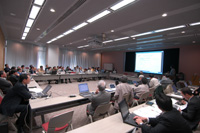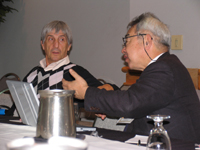 |
|
|
 |
Why are Accelerator Schools Important?

Students who attended the most recent accelerator school at Cornell University this past summer received hands on experience in the accelerator control room. (Photo courtesy of USPAS)
|
In May 2006, the GDE, ICFA Beam Dynamics Panel and the International Linear Collider Steering Committee will sponsor the International School for Linear Colliders. As the first accelerator school that will be focused on linear colliders, the goal of the school is to recruit new young scientists to join the global ILC effort. While another article in today's issue of NewsLine reports on more details about this upcoming school, it seems appropriate to take a deeper look into the role of accelerator schools in the field of particle physics.
For more than 25 years now, accelerator schools around the world have played an increasingly larger role in educating and recruiting accelerator physicists. DESY's Nick Walker, who has attended CERN's Accelerator School and taught in the U.S. Particle Accelerator School, explained that these schools are the basic place where physicists and engineers learn how to build and operate accelerators. "My generation and the generation before mine learned about accelerators on the job", he said. "But now these machines have become so complicated and specialized that on the job training isn't sufficient. The accelerator schools play an enormous role."
Read more...
--Elizabeth Clements
|
 |
|
|
 |
Upcoming meetings, conferences, workshops
CARE 05
CERN, Switzerland, 23-25 November 2005
Mini Workshop on Design
for High Availability
Hotel CARAT at Grömitz (located at the Baltic
Sea), 1-2 December 2005
ILC Spanish Meeting
Gandia, Spain, 1-3 December 2005
TESLA Technology Collaboration Meeting
Frascati, Italy, 5-6 December 2005
GDE Meeting
Frascati, Italy, 7-10 December 2005
American Linear Collider Physics Group - Detector Simulation Workshop
Colorado, U.S.A., 9-11 January 2006
2006 LCWS 2006
Bangalore, India, 9-15 March 2006
International School for Linear Colliders
Sokendai, Graduate School for Advanced Studies
Hayama, Japan, 19-26 May 2006
|

KEK DG Yoji Totsuka and Japanese linear collider collaboration members reported their progress to the members of the KEK Linear Collider Project Promotion Committee on 14 November. 25 members of the committee oversee the linear collider R&D efforts.
|
|
 |
 |
|
|
 |
ILC Scientists Organize International School for Linear Colliders

Shin-ichi Kurokawa (right) discusses how to create an International School for Linear Colliders with Jean-Pierre Delahaye at the committee meeting that was held during the Snowmass workshop in August.
|
At the Snowmass Workshop, amid the debates over detectors, linac design and costing estimates, a committee organized an accelerator school to recruit new young physicists to join the International Linear Collider collaboration. On 17 August, a nine-person committee chaired by Global Design Effort Director Barry Barish met to start organizing the International School for Linear Colliders. The first global accelerator school to have such a defined focus, the International School for Linear Colliders will be held on 19 May 2006 to 27 May 2006 at Sokendai, the Graduate School for Advanced Studies, in Hayama, Japan, just 70 kilometers south of Tokyo. The committee will accept up to 80 students from around the globe.
"The committee feels that it is important to encourage young physicists to work in the accelerator field, and the school will provide this opportunity for young researchers," said Weiren Chou, a Fermilab physicist and chair of the Beam Dynamics Panel for the International Committee for Future Accelerators (ICFA). "It is critical that we train the young generation in order to have a great international project."
The GDE, ICFA Beam Dynamics Panel and the International Linear Collider Steering Committee will sponsor the accelerator school. "It is important to have a good mixture of nationalities," said KEK physicist and ILCSC Chair Shin-ichi Kurokawa, who has experience organizing accelerator schools in such places as China and Jordan. "Accelerator schools are very important. We live together, eat together and work together from morning to evening. It is quite a good experience for young researchers, and in the case of the ILC, we really need this kind of program."
The school will focus on the ILC, but it will also cover multi-TeV colliders, such as the Compact Linear Collider. The organizing committee will design a seminar style school that will have homework but no exams or university credit. Committee members will select lecturers from around the world and will also plan a number of cultural talks that will focus on ILC physics and detectors.
More information is available online.
--Elizabeth Clements
|
 |
|
|
 |
From AON Digital World
15 November 2005
"ILC": Teilchenphysiker planen nächsten Coup
The new particle accelerator "Large Hadron Collider (LHC)" at the European research center CERN is not yet in operation, but a consortium of physicists meeting in Vienna is already planning the next coup. A large linear accelerator (ILC) shall provide the ultimate answer to "why the world exists at all."
Read more... (Story in German)
From FYI -
The American Institute of Physics Bulletin of Science Policy News,
10 November 2005
FY 2006 Department of Energy Science Budget Bill Complete
The Department of Energy's Office of Science will receive a 0.9% increase in its total budget for FY 2006. Energy and Water Development Appropriations Subcommittee Chairmen Pete Domenici (R-NM) and David Hobson (R-OH) and their colleagues have completed work on their FY 2006 funding bill, H.R. 2419. This bill has been approved by the House, and is awaiting action on the Senate floor.
Read more...
|
|
 |
 |
|
|
 |
Progress with the BCD
Today I am going to give an update on our progress towards the Baseline Configuration Document (BCD). The major goal of the GDE this calendar year is to produce a baseline configuration for the ILC and to document it by the end of 2005. This configuration will be the culmination of a lot of very hard work, especially from the working groups that were formed at the first ILC workshop at KEK and have served us well through Snowmass and now in forming our baseline.
After Snowmass, our first goal was to quickly document the outcomes and recommendations, post them on the GDE website, invite comments, assess the results and organize the effort needed to reach the baseline. The Snowmass conclusions and recommendations for the most part were documented by early September and posted on the web. The GDE Executive Committee, consisting of Tor Raubenheimer, Nick Walker, Kaoru Yokoya, Gerry Dugan, Brian Foster, Fumihiko Takasaki and myself, met at SLAC on September 17-18. At that meeting, we assessed the results and made a work plan for the fall. This included writing assignments, reading assignments, as well as the formation of task groups to write white papers on special issues.
A lot of very good work has been accomplished and most of the elements we need to produce a tiered electronic BCD now exist. The GDE Executive Committee is meeting again this week at SLAC to assess each chapter of the BCD, make final decisions or possibly make changes, and make final preparations for this "strawman" BCD to be released to the GDE and the broader ILC community. We expect to announce the links that will give broad open access to this draft document within the next few days.
It will then be possible for this "strawman" BCD to be studied and critiqued in detail by the community in preparation for our GDE meeting at Frascati, Italy from December 7-9. A preliminary agenda for the Frascati meeting can be found on the ILC Website, as well as information on registration and accommodations. The GDE meeting is open and we hope to have very good participation from GDE members and from the broader ILC community.
Read more...
--Barry Barish
Director's Corner Archive
|
 |
|
|
 |
|
Do you live off crackers and mustard? Keep 20 pounds of tuna casserole in the fridge?
If you were ever a graduate student, chances are that you have consumed some interesting creations at your dinner table -- or more likely in a control room somewhere. Fermilab's Office of Public Affairs is interested in what you survived on - or currently survive on - as a graduate student. They are looking for recipes and stories about what former and current graduate students eat. If you have something interesting, they will get in touch with you and include your recipe/story in a piece for symmetry magazine. You may also be featured in Fermilab Today. Send an e-mail to today@fnal.gov with your recipe and please be sure to include a way for them to reach you.
ILC Related Preprints
hep-ph/0511144 - Hard Pomeron in exclusive meson production at ILC, 11 Nov 2005
hep-ph/0511137 - SUSY Parameter Measurements with Fittino, 10 Nov 2005
hep-ph/0507037 - New physics in e+ e- -> Z gamma with polarized beams, 24 Oct 2005
ILC-Asia-2005-23 by Kiyoshi Kubo (KEK) - Beam Dynamics in Curved ILC Linacs (following the earth
curvature
Correction
Last week's issue of ILC NewsLine incorrectly stated the meaning of IUPAP. The correct meaning of the acronym is the International Union of Pure and Applied Physics, an international non-governmental organization devoted to the advancement of physics. It was established in 1922 and the first General Assembly was held in 1923 in Paris. ILC NewsLine regrets the error.
|
|

